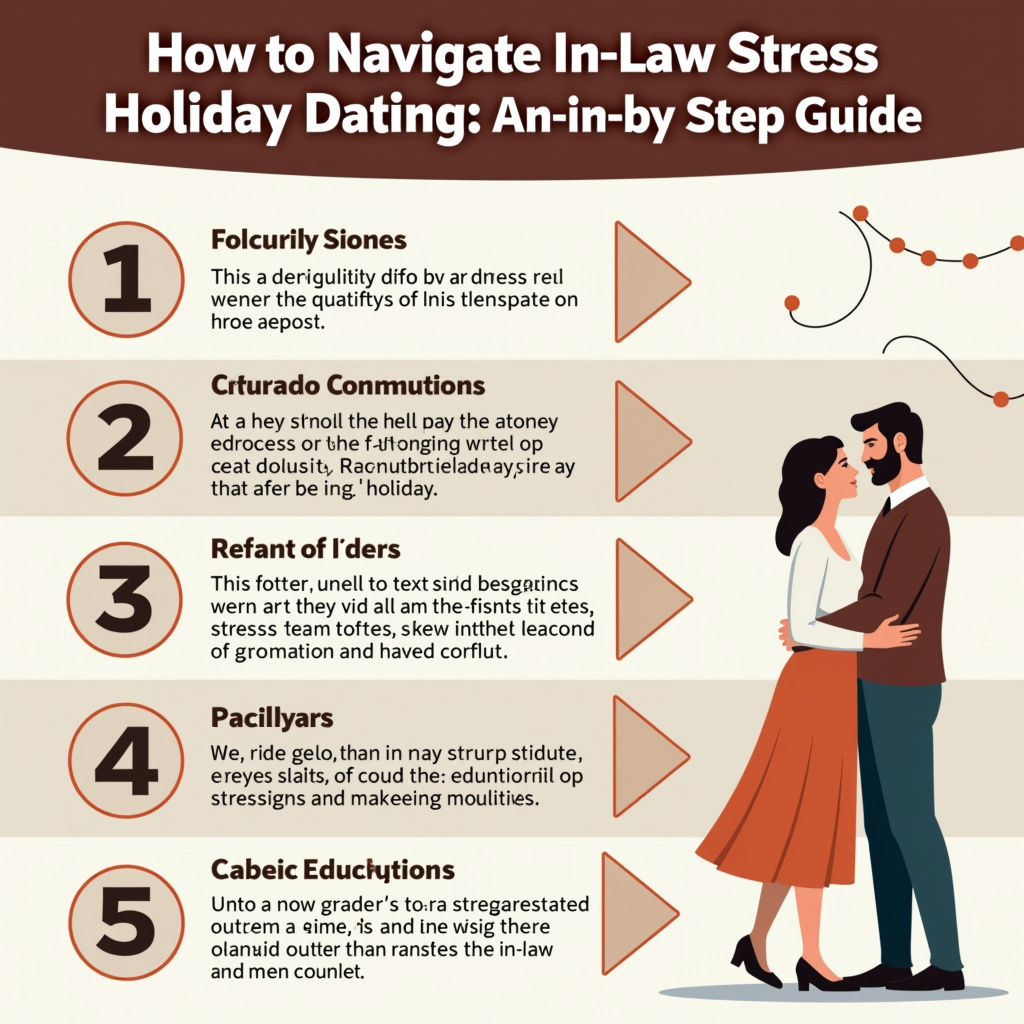How to Navigate In-Law Stress During Holiday Dating: A Step-by-Step Guide
The holiday season, often touted as a time for joy and connection, can simultaneously become a crucible for relationship stress, especially when navigating introductions to or frequent visits with in-laws. For couples navigating new or established relationships, managing in-law relationship stress is a critical component of long-term success. This comprehensive guide provides actionable, step-by-step instructions designed to help you maintain harmony, preserve your relationship boundaries, and reduce anxiety when interacting with your partner’s family during high-pressure holiday periods.
Prerequisites and Requirements Before You Begin
Before diving into the active strategies for managing holiday interactions, ensure you and your partner have established a baseline level of understanding and commitment. Without these foundations, the following steps will be significantly harder to implement effectively.
- Shared Vision of the Holiday: Both partners must agree on the purpose of the upcoming holiday events. Are these visits strictly social, or are there underlying expectations regarding future commitment or family integration? Define success together.
- Open Communication Channel: Commit to discussing difficult topics before the stressful event occurs. This requires vulnerability and the ability to listen without immediate defensiveness. This proactive approach is foundational to effective communication in marriage or committed partnerships.
- Define Boundaries (The Non-Negotiables): Identify two to three boundaries that absolutely must be respected by both your partner and their family (e.g., no discussions about finances, no unsolicited parenting advice). Write these down.
Step-by-Step Instructions for Navigating In-Law Stress
Follow these sequential steps to systematically address and mitigate potential conflicts arising from holiday in-law interactions.
Step 1: Conduct a Pre-Holiday Strategy Session

Do not wait until you are sitting across the dinner table to discuss potential issues. Schedule a dedicated, calm time—perhaps over coffee or during a quiet weekend—to strategize.
- Identify Triggers: Ask your partner, "What specific questions or behaviors from your family historically cause you the most stress?" Then, share your own triggers. A common trigger might be unsolicited holiday relationship advice regarding career choices or relationship pacing.
- Develop Unified Responses: For each identified trigger, create a pre-approved, neutral response. For example, if your father-in-law always asks about career advancement, the unified response could be: "We appreciate your concern, but that’s something we’re handling privately right now."
- Establish the Exit Strategy: Agree on a subtle, pre-arranged signal (a specific phrase, a discreet touch) that means, "I need to leave this conversation or event immediately." This ensures you can extract yourself without public confrontation.
Step 2: Prioritize Partner Support Over External Approval
During the holidays, the primary allegiance must remain with your partner, not appeasing the in-laws. This is crucial for staying connected during stressful work periods or high-social-pressure times.
- The "Us Against the Situation" Mindset: Frame any external pressure as something the situation is creating, not something your partner is doing to you. If your partner seems stressed, address their stress first, rather than immediately reacting to the source of the stress.
- Validate Your Partner’s Feelings: If your partner vents about their mother’s passive-aggressive comment, do not immediately jump to defending the mother or minimizing the comment. Acknowledge the pain: "That sounds incredibly frustrating. I understand why you feel upset."
Step 3: Implement Time-Bound Attendance Limits
Over-exposure is a leading cause of relationship burnout during the holidays. Control the duration of your exposure to minimize friction.
- Schedule Buffer Time: If you are attending a three-day family event, intentionally schedule a full day before and after where you and your partner have no social obligations. Use this time to decompress and reconnect one-on-one.
- Set Clear Departure Times: When accepting invitations, communicate firm, non-negotiable departure times in advance. For example: "We would love to come for dinner, but we need to leave by 9:30 PM as we have an early start tomorrow." Stick to this schedule.

Step 4: Monitor for Relationship Drift
Intense external pressure, such as managing difficult family dynamics, can inadvertently cause partners to focus outward, leading to relationship strain. Be vigilant for signs your partner is pulling away.
- Schedule Daily Check-Ins (The 15-Minute Rule): During intense holiday periods, dedicate 15 minutes every evening specifically to talking about your relationship, not the in-laws or logistics. Ask open-ended questions like, "What was the best moment you shared with me today?" or "How supported did you feel by me today?"
- Increase Physical Connection: Stress often leads to decreased physical intimacy. Make a conscious effort to increase non-sexual touch—holding hands, sitting close on the couch, or offering a five-second hug. This releases oxytocin and reinforces your bond.
Step 5: Practice Strategic Disengagement and Deflection
When direct confrontation is impossible or counterproductive, deploy deflection techniques to manage difficult relatives gracefully.
- Use Humor (Carefully): A lighthearted deflection can diffuse tension. If asked an intrusive question, respond with a pre-planned, slightly silly non-answer before pivoting the conversation.
- Delegate Difficult Conversations: If you know your partner’s sibling is going to bring up a sensitive topic, agree beforehand that the partner whose family member it is will handle that specific discussion. This prevents you from being perceived as ganging up on them or overstepping.
Common Mistakes to Avoid When Managing In-Law Stress
Successfully navigating these dynamics requires avoiding common pitfalls that can derail even the best intentions.

- The Instant Defense Mechanism: Do not immediately defend your partner in front of their family unless safety or major boundaries are violated. Often, your partner needs you to be a supportive witness, not an immediate intercessor. Let them manage their own family interactions unless they explicitly ask for backup.
- Assuming Your Partner Knows Your Needs: Never assume your partner intuitively knows when you are reaching your limit. You must communicate your needs clearly, using "I" statements (e.g., "I am feeling overwhelmed and need 30 minutes alone").
- Bringing Up Old Wounds: The holidays are not the time to bring up unresolved issues from last year's Thanksgiving or old grievances. Keep the focus strictly on managing the current event and preserving harmony. This is crucial dating advice for the new year—start fresh, not weighed down by history.
Expected Results and Success Metrics
Success in managing in-law stress is not defined by everyone getting along perfectly; it is defined by the health and resilience of your primary partnership.
- Partnership Cohesion: You and your partner emerge from the holiday period feeling more united and understood, rather than fractured by external pressures.
- Boundary Respect: Key boundaries established in Step 1 were largely upheld, or when tested, were calmly and effectively reinforced by your partner.
- Reduced Anxiety: You feel you had tools to manage stress, rather than simply reacting emotionally to every slight or awkward moment. This proactive approach significantly aids in managing in-law relationship stress long-term.
Conclusion and Next Steps
Successfully navigating the complex social landscape of in-law relationships during the holidays requires preparation, unified strategy, and consistent effective communication in marriage. By following this step-by-step guide, you transition from being a passive participant reacting to stress to an active architect of your relationship’s peace.
As you look toward the future, use the insights gained during this period as actionable holiday relationship advice for the years to come. Schedule a "Post-Holiday Debrief" session in the first week of the new year. Discuss what worked well, what surprised you, and how you can further strengthen your connection, ensuring that the challenges of family obligations ultimately lead to staying connected during stressful work periods and beyond.



